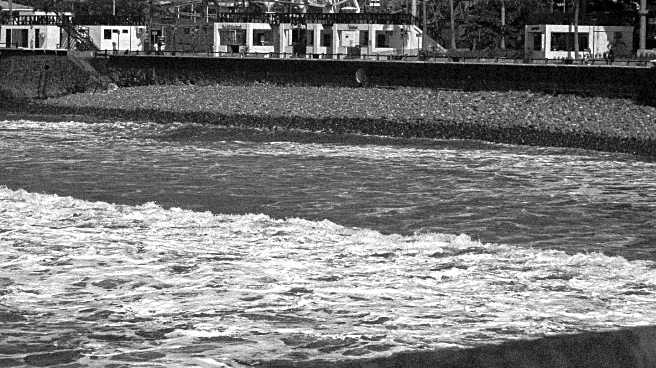What's Happening?
Coney Beach amusement park in Porthcawl, Bridgend, has closed its gates permanently, marking the end of an era for the seaside attraction that entertained families for over a century. Following its closure,
various historical artifacts from the park, including vintage signs, clown heads, and a Michael Schumacher statue, have been put up for sale by Valleys Reclamation. The reclamation yard, owned by David Redmond, has seen significant interest from the public, with many locals eager to purchase pieces of nostalgia. The items have attracted crowds, with some individuals finding personal connections to the memorabilia, such as signs bearing family names or references to past employment at the park.
Why It's Important?
The sale of Coney Beach's memorabilia represents a significant cultural moment for the local community, as residents seek to preserve memories of the beloved amusement park. The closure of the park reflects broader trends in the amusement industry, where traditional attractions face challenges from modern entertainment options and changing consumer preferences. The interest in purchasing memorabilia highlights the emotional and historical value attached to such sites, underscoring the importance of preserving cultural heritage. Additionally, the sale provides an opportunity for local businesses like Valleys Reclamation to capitalize on the nostalgia market, offering unique items that resonate with personal and collective histories.
What's Next?
As the sale of Coney Beach's memorabilia continues, Valleys Reclamation plans to acquire more items from the park, potentially expanding its offerings to meet public demand. The closure of the park may prompt discussions about the future use of the site, with potential redevelopment opportunities that could benefit the local economy. Community stakeholders may engage in conversations about preserving the park's legacy through commemorative events or exhibitions. The interest in the park's artifacts could also inspire similar initiatives at other historical sites facing closure, encouraging efforts to maintain cultural connections through tangible memorabilia.
Beyond the Headlines
The closure of Coney Beach amusement park and the subsequent sale of its memorabilia raise broader questions about the preservation of cultural landmarks and the role of nostalgia in community identity. As traditional amusement parks struggle to compete with modern entertainment options, the importance of maintaining historical sites becomes increasingly apparent. The emotional attachment to such places highlights the need for thoughtful approaches to redevelopment and heritage conservation, ensuring that future generations can appreciate and learn from past experiences. The sale of memorabilia also reflects societal trends in valuing tangible connections to history, offering insights into how communities navigate change while honoring their cultural roots.









